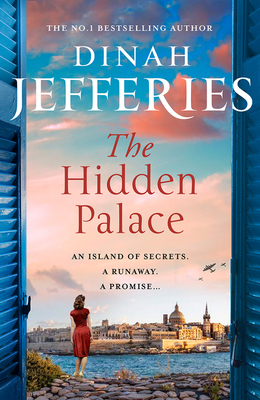A rebellious daughter
1923. Among the ancient honey-coloured walls of the tiny island of Malta, strangers slip into the shadows and anyone can buy a new name. Rosalie Delacroix flees Paris for a dancer’s job in the bohemian clubs deep in its winding streets.
A sister with a secret
1944. Running from the brutality of war in France, Florence Baudin faces a new life. But her estranged mother makes a desperate request: to find her vanished sister, who went missing years before.
A rift over generations
Betrayals and secrets, lies and silence hang between the sisters. A faded last letter from Rosalie is Florence’s only clue, the war an immovable barrier - and time is running out....
Comment: I purchased this book months ago, in a rare situation nowadays, which is me being able to shop at a physical bookstore where English books are up for sale. It's not that these places don't exist, but none exist near enough for me to browse frequently and most books in English I buy are online. Anyway, I got this book due to the evocative cover and because of the blurb...
Well... I can say this author is certainly a competent writer and someone who can use whatever research facts/information from historical documents she found to the best use, but... I'm sorry to say her style just didn't do anything for me. When I say this I'm talking about the fictionalized tale and what is written being so captivating, I had to know what was happening next. This never happened and I think the issue is the perceived lack of emotional vibes, even when discussing or mentioning certain content.
While reading, I kept thinking about another author who writes in a way I'd day feels similar, Diane Chamberlain. I've read one of her books years ago and is was also dual time (different settings and story of course) but my reaction was almost the same. I liked that one a little more than this one because some of the romantic elements in that other book felt a notch higher than here, whose romance just felt ridiculously thin and lacked interest. It's really a pity because the story has enough elements to make it incredible, but for the most part I was actually a little bored.
As I kept reading, it became clear there are several undercurrents regarding the characters' relationships which I didn't have because I didn't read the first book. This makes me think the overall story is actually ongoing, and this isn't one of those trilogies where the stories are fully independent, but what I glimpsed did not win me over. Neither Florence in 1944 nor Rosalie in 1925 felt like women I would be interested in befriending, even though they act with what they have. However, it does gets on my nerves a little how people, when things are difficult, when there aren't things such as online booking or text messages, can simply decide to do something and do, without knowing if they can accomplish them. I'm thinking Rosalie going to Malta because of a newspaper article and Florence going to Devon without knowing how she could earn money.
Despite this, I kind of warmed up to Rosalie a little more easily because she was a determined young woman and she had faith in herself. The whole set up for her to make the decision to go to Malta is very thin and it bothered me the author included so many things to establish her historical facts/locations/events, but the personal lives of the characters lacked depth and consistency. Florence also annoyed me a little because if she knew her sister liked Jack, and once she learns of a certain fact about him, she feels she should avoid him but does not actively do something. Why couldn't she gain some backbone, after all the certainly bad things she saw in France? She annoyed me.
As the stories of each protagonist move along, I don't think there's any wonder in guessing some things don't go well for them. Would this be the moment we could sympathize and try to place ourselves in their shoes, imagining what we would feel in their place? Sadly, I didn't exactly did this exercise because things were being shared in such an ordinary but bland manner, I didn't think I'd need to care. I could process some terrible situations by simply turning the pages and when I got to the end, I wasn't in any way different, feelings wise, in relation to how I felt before opening the book.
When the story is about to end, the author adds a few dramatic scenes/situations to highlight the chance that it is to live, to make decisions, to do something we might feel is necessary... I got the feeling this was meant to spice up the drama and the characters' steps, but I was actually disappointed, after all we went through all those pages and the end isn't even amazing anyway... well, not to me, I can imagine it worked for other readers.

It often feels to me that when the blurb mentions two timelines, the book will remain firmly in "not genre romance" territory. It may lean more so-called "women's fiction" (all about the heroine's journey/character arc) or "literary fiction" (not so much about relationships--or, if there are any, they aren't healthy nor happy ones).
ReplyDeleteFrom what you share in your review, that's pretty much the case here; I'm sorry the book didn't fulfill the expectations set for you by the cover and blurb.
Hi!
DeleteI was not hoping for a larger than life romance, to be fair. But other books with dual timelines I've read before managed to convey romance vibes in a more appealing way. Perhaps this wasn't the author's intention anyway, but she did create the situation for romances to be part of both protagonists, so... I did expect those to be better done, yes.
Thank you, the search for the next gem continues!